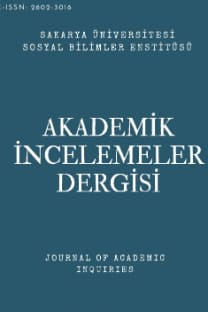Terörle Mücadele Stratejileri Bağlamında “Müzakere”: Türkiye Örneği
Tarihsel süreçte devletler terörle mücadeleyi daha çok kendi varlığına yönelen terör içerikli tehditleri veya tehdidin kaynağı terör örgütünü silahlı mücadele yöntemiyle ortadan kaldırma anlayışı üzerine kurgulamışlardır. Ancak terörle, teröre neden olan ekonomik, sosyal, kültürel, etnik ve siyasi genel koşulları da dikkate alarak topyekûn mücadele etmeden kapsamlı ve kalıcı bir başarı elde edilemeyeceğinin zamanla anlaşılması, bir üst tanımlama olarak terörizmle mücadele olgusununu ortaya çıkarmıştır. Bu gelişmeyle birlikte, çoğu zaman çatışmanın alternatifi olarak düşünülen müzakere olgusu, terörizmle mücadelede bir yöntem olarak önem kazanmaya başlamıştır. Yine devlet aktörleri resmi ya da gayri-resmi kanallar vasıtasıyla terör örgütleriyle konuşup görüşmeyi sürdürseler de, bu faaliyetler çoğu zaman bir giz perdesi arkasına saklanmış veya yalanlanmıştır. Müzakereleri değişik gerekçelerle kamuoyundan saklama çabası da, bu olguya ilişkin teorik bir yaklaşım geliştirme çabalarını olumsuz yönde etkilemiştir. Dolayısıyla, geçmiş dönemlerin aksine terörün gerçek anlamda küresel etkiler meydana getirebildiği, devletlerin de bu sorunu artık ivedilikle çözme niyet ve gayretine girdikleri günümüzde, teröristle müzakere olgusunun terörizmle mücadelenin bir unsuru olarak nasıl bir akademik analize tabi tutulabileceği sorusuna yanıt verilmesi bir gereklilik halini almıştır. Ortaya konulan gerekçeler ışığında bu çalışmanın ilk bölümünde, terörizmle mücadele stratejileri kapsamında gündeme gelen teröristle müzakere olgusu; teröristle müzakere edilmeli mi edilmemeli mi, kiminle müzakere edilmeli, ne zaman ve nasıl müzakere edilmeli soruları kapsamında akademik disipline, koşullara, sınırlamalara uygun genel bir analitik çerçeveye oturtulmaktadır. Çalışmanın ikinci bölümünde ise; Türkiye’de açılım süreci olarak başlayan ve daha sonra çözüm süreci olarak yeniden tanımlanan müzakereler, müzakereler bağlamında yürütülen tartışmalar kapsamı ilk bölümde belirlenen analitik çerçevede değerlendirilmektir.
Negotiation as a Component of Combating Terrorism: The Turkish Case
Throughout history state actors have largely constructed their counterterrorism strategy on the notion of eliminating terrorist threats or terrorist organizations that have become the source of such threats. However, with the realisation that there can be neither a comprehensive, nor a lasting success without considering the economic, social, cultural, ethnic and political conditions of terrorist threats, combating-terrorism has emerged as a superseding notion. Hence, negotiating with terrorists, a concept which has hitherto been deemed alternative to conflict, has begun to increase in significance as another instrument for countering-terrorism.Meanwhile, despite continuing to talk and deal with the terrorist groups through official or non-official channels, state actors have preferred to conceal their activities behind secrecy or total denial. Such attempts as to hide negotiations from the public for whatever reasons there may be, in time has proved to be a negative impact over efforts to develop a theoretical approach for the very same concept. Thus, contrary to the past in today’s world as terror holds the potential to produce global impacts and states are just showing serious intentions as well as taking genuine steps towards resolving the terror problem, it is essential to present an explanation for the question of how to subject the issue of negotiating with terrorist, as a component of combating-terrorism, to an academic analysis. In view of all that, the first part of this study has been reserved for; placing the concept of negotiating with terrorist over an analytical framework which is developed within the confines of such questions of whether, with whom, when and how to negotiate, whilst adhering to the rules of academic discipline, conditionality and restrictions. In the second half of the study; the so called “Kurdish opening process” and then “resolution process”, both of which have been underway in Turkey for some time now, are assessed according to the previously set out analytical framework.
